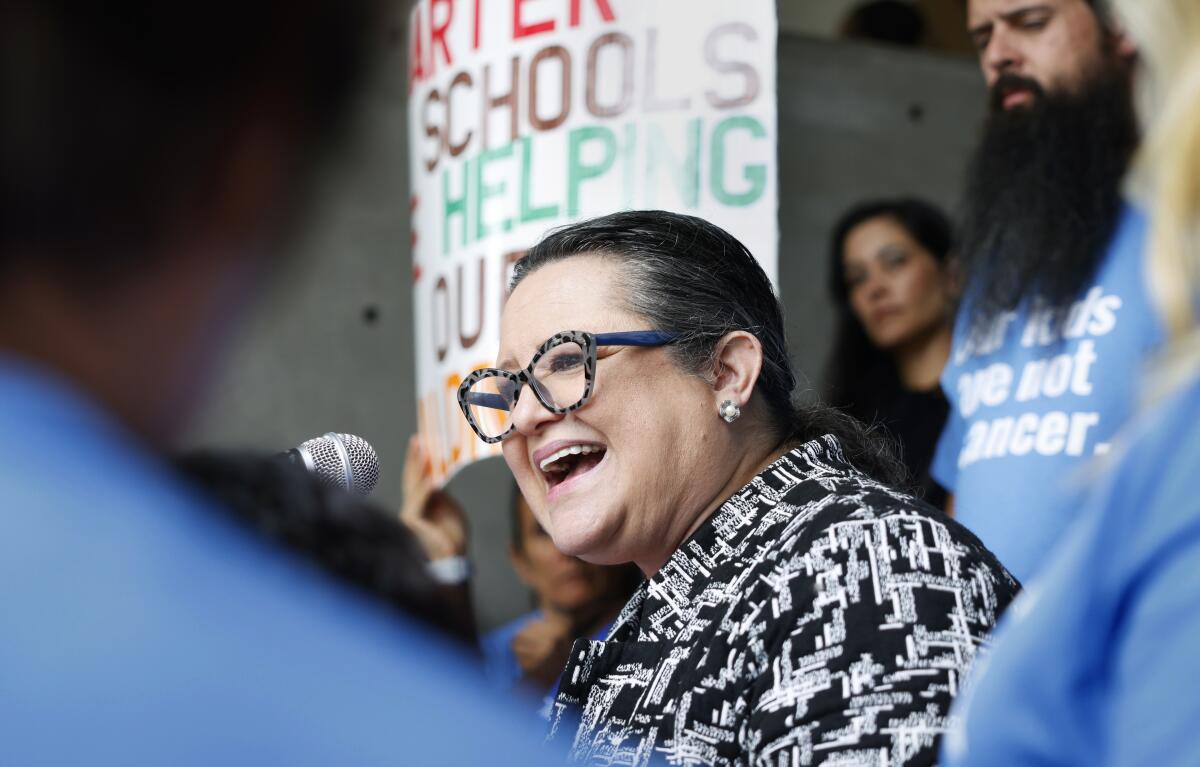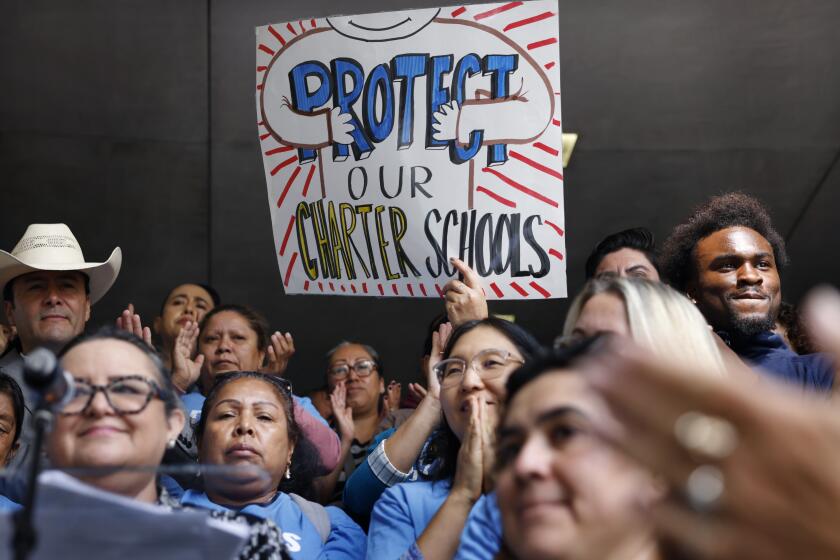LAUSD banned charter schools from many of its campuses. Now charters will fight it in court

- Share via
A battle over the rights of charters to use Los Angeles Unified school campuses has moved to the courts with the filing of a lawsuit Tuesday targeting a recently approved district policy.
The California Charter Schools Assn. alleges that L.A. Unified acted illegally when the Board of Education recently voted to restrict where charters could locate as well as the classrooms they could use.
“Despite offering to work collaboratively with the board on a new policy that would improve the process of sharing campuses, LAUSD disregarded the voices and needs of charter school families and adopted a new policy to harm their schools,” said Myrna Castrejón, president and chief executive of the charter association. “The lawsuit comprehensively explains to the court how the policy is in direct violation of state law and should be invalidated.”
L.A. Unified School District officials had no immediate comment on the lawsuit, but have maintained that their revised charter school policy is legal. Board of Education members have said that, all along, they asked senior administrators to craft a policy that would comply with laws governing charter schools. Policy supporters also said that charters would continue to receive reasonable offers of campus space.
L.A. school officials say policy limiting campus sharing with charters protects key programs from being undermined. Charters say rules are unfair, illegal.
The policy, passed by a 4-3 vote, prohibits the new location of charters at campuses with special space needs or programs. One early staff estimate put the number of affected campuses close to 350, but there’s uncertainty over how the policy will be interpreted. The school system has about 850 campuses.
Charter advocates are concerned that charters could be pushed out of areas where they currently operate, making it difficult for them to remain viable. Another fear is that more charter schools will split up between campuses, making them harder and more expensive to operate — and less convenient for parents.
Under the policy, district-operated campuses are exempt from new space-sharing arrangements when a school has a designated program to help Black students or when a school is among the most “fragile” because of low student achievement. Also exempt would be community schools, which incorporate services for health, counseling and other needs of students and their families. The state also has designated some local charters as community schools, which the district policy does not account for.
Members of the school board majority said the new rules would protect needed space beyond the normal allotments for classrooms, counselors, health staff and administrators — for example, rooms for tutoring, enrichment or parent centers. Such spaces had frequently been tabulated as unused or underutilized — and then made available to charters.
Board President Jackie Goldberg has repeatedly minimized the impact the new policy will have on charter schools that already have sharing arrangements.
Powerful unions and Proposition 28 author Austin Beutner say school districts are misusing money for expanding K-12 arts education and call for state intervention.
The new rules also discourage placing charters where they could disrupt traditional feeder-school patterns. Goldberg cited the example of a charter middle school on a district-run elementary campus. The charter school, she suggested, would have an unfair advantage in recruiting those elementary students, undermining the local, district-run middle school.
Access to public school campuses for charter schools is guaranteed under state law, and the lawsuit asserts that the new policy is illegal.
The state laws “are premised on the fact that public school facilities are paid for by taxpayers, so school districts hold them in trust for the use of public school students,” the lawsuit states. “The concept is that if students did not enroll in charter public schools they would attend district-run schools, so school districts should have already planned to have seats for them.”
Although operated privately, charters are free public schools that, in California, are supposed to be operated by a nonprofit organization. Most charters are nonunion.
Finding a place to operate — especially in the expensive real estate market of L.A. — always has been a challenge for charters, a factor that led advocates to push successfully for the legal right to claim public school space at an affordable rent.
Under state law, students at charters are entitled to “reasonably equivalent” learning conditions compared to those at district-operated schools.
The new policy is flawed, the lawsuit argues, because it presumes charters are entitled only to “leftovers,” space that the district has no need for after making use of whatever other rooms and areas a school or program would want.
In the current school year, 52 independent charters operate on 50 campuses, according to L.A. Unified. This year 45 charters are seeking space, per the charter association, down significantly from a peak of more than 100. But even 50 schools would make for one of the larger school systems in California.
In all, there are 221 district-authorized charters and 25 other local charters approved by the county or state, serving about 118,000 students, or 1 in 5 public school students within the boundaries of L.A. Unified. Most charters operate in their own or leased private buildings.
The L.A. school system has more charters than any other district in the nation. Most were approved under charter-friendly school boards and under state laws — since changed — that made it difficult for school districts to reject charters.
The resolution that led to the new regulations — and which passed narrowly — was co-authored by Goldberg, who is not running for reelection in November, and Rocio Rivas, who is not yet up for reelection. The policy also was supported by George McKenna, who is not running for another term, and Scott Schmerelson, who faces a strong challenger.
As a result, shifting political dynamics could affect the charter policy as well as legal challenges.
The school board passed the charter policy Feb. 13, but the charter association forced a do-over vote on March 16 because McKenna, 83, who was recovering from surgery, had not properly signed into the earlier meeting from his home.
On March 16. McKenna could have voted from home but decided to attend in person, moving slowly, his surgically repaired shoulder in a sling.
Charter advocates used the occasion to plead their case once more, but the resulting vote was unchanged.
More to Read
Sign up for Essential California
The most important California stories and recommendations in your inbox every morning.
You may occasionally receive promotional content from the Los Angeles Times.













